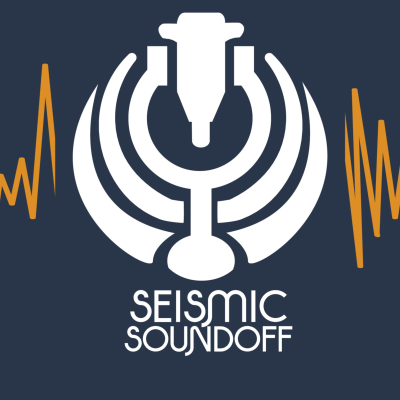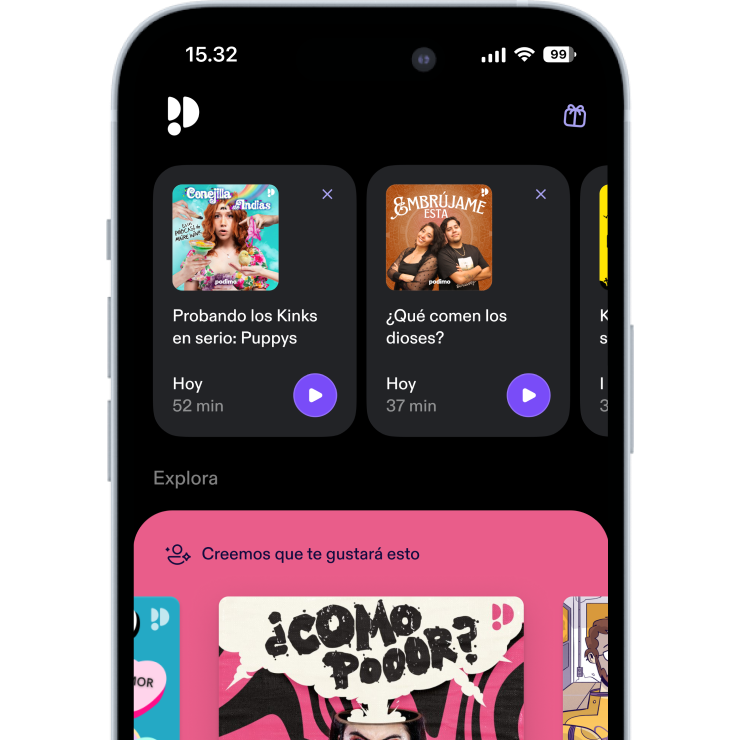
Seismic Soundoff
Podcast de Society of Exploration Geophysicists (SEG)
Empieza 7 días de prueba
$99.00 / mes después de la prueba.Cancela cuando quieras.

Más de 1 millón de oyentes
Podimo te va a encantar, y no estás solo/a
Rated 4.7 in the App Store
Acerca de Seismic Soundoff
Seismic Soundoff showcases conversations addressing the challenges of energy, water, and climate. Produced by the Society of Exploration Geophysicists (SEG), these episodes celebrate and inspire the geophysicists of today and tomorrow. Three new episodes monthly.
Todos los episodios
264 episodios“We want attendees to walk away saying they learned something new, made a new connection, or heard a crazy idea that just might change how they work. That’s the success we hope IMAGE brings.” In this episode of Seismic Soundoff, Julian Chenin and Paula de Oliveira share what makes IMAGE 2025 the premier geoscience event you won’t want to miss. From global collaboration and interactive pavilions to fostering the next generation of geoscientists, they reveal how IMAGE is shaping the future of energy and applied geophysics. Whether you’re looking to learn, network, or discover a new idea, this conversation will inspire you to get the most out of your IMAGE experience. KEY TAKEAWAYS > IMAGE is more than a conference; it’s a global, collaborative space where geoscientists, students, and industry leaders tackle energy challenges together while celebrating the profession. > New and expanded features like core displays, K-12 engagement, and networking hubs are designed to connect you with emerging technologies, fresh ideas, and career opportunities. > Planning using the IMAGE preview guide will help you make the most of your time, ensuring you catch key technical sessions, panels, and the conversations that can spark your next breakthrough. CALL TO ACTION Explore the IMAGE 2025 Preview Guide at https://imageevent.org/ and start planning your conference experience today. And if you’re ready to give back, consider volunteering or mentoring to help shape the next generation of geoscientists while expanding your network and skills. THIS EPISODE SPONSORED BY KATALYST DATA MANAGEMENT Katalyst Data Management® provides the only fully integrated, end-to-end subsurface data solution to the oil and gas industry. Visit us at IMAGE 2025, Booth #1129, from August 25–28 to meet our global team and learn how we help clients gain value from their seismic and well data. We’ll have live demos and presentations of our latest technology and what’s next in subsurface data. Learn more at www.katalystdm.com and socials. LINKS * Register for IMAGE 2025 at https://www.imageevent.org/ * Read the Preview Guide at https://irp.cdn-website.com/3c79eb10/files/uploaded/IMG25_PreviewGuide_Rev20250701_web.pdf * Visit https://seg.org/podcasts/episode-263-image-2025-innovation-collaboration-and-the-future-of-energy/ for the complete show notes.
"Volunteering helps you build your network, sharpen your skills, and open doors you didn’t know existed." In this episode of Seismic Soundoff, SEG all-star volunteers Sergio Chávez-Pérez and Joe Reilly reflect on their recent articles in The Leading Edge’s President's Page series. They delve into the importance of professional growth, how SEG supports geophysicists worldwide, and why now is a pivotal time for the profession. With decades of experience and deep involvement in SEG, they offer wisdom, encouragement, and actionable advice for navigating today's changing energy and tech landscapes. KEY TAKEAWAYS > Stay curious and connected: Volunteering with SEG builds professional networks, encourages lifelong learning, and often leads to unexpected opportunities. > Adapt to change: The energy transition, AI, and global opportunities are transforming the geosciences - SEG webinars, journals, and programs help you stay ahead. > Understand before you apply: AI is powerful, but critical thinking and understanding the fundamentals are key to meaningful application in geophysics. CALL TO ACTION Read Sergio and Joe’s President's Page articles in The Leading Edge to dive deeper into their ideas. And if you’re inspired, get involved - join a webinar, volunteer, or become a mentor. SEG thrives because of passionate members like you. LINKS * Joseph Reilly, (2025), "President's Page: What excites you (professionally)?," The Leading Edge 44: 241–242. https://doi.org/10.1190/tle44040241.1 * Sergio Chávez-Pérez, (2025), "President's Page: Follow, understand, and do with SEG's help," The Leading Edge 44: 77–77. https://doi.org/10.1190/tle44020077.1 * Visit https://seg.org/podcasts/episode-262-more-than-membership-turning-seg-engagement-into-career-growth/ for additional links.
"We're seeing rapid advances both in seismic acquisition technologies and in processing techniques. In order to get data that is appropriate for full waveform inversion, you have to rethink how you're acquiring the data in the field." In this episode, host Andrew Geary speaks with Andrea Crook, CEO of OptiSeis and lead instructor of the IMAGE 2025 short course, Innovations in Land Seismic Acquisition. Andrea explores the seismic design landscape, breaking down how advances in sources, sensors, sampling, and sustainability are reshaping land acquisition. Listeners will walk away with practical strategies to enhance survey quality, minimize environmental impact, and more effectively connect acquisition with processing and interpretation. KEY TAKEAWAYS > Innovations in survey design, such as high-density Vibroseis and nodal systems, lead to improved data and safer operations. > Sustainability in seismic acquisition isn’t just good for the planet - it also drives cost efficiency and long-term data value. > Course attendees will learn how to evaluate survey trade-offs, enhance trace density, and make informed decisions using real-world examples. CALL TO ACTION Ready to improve your surveys and future-proof your data? Sign up for Innovations in Land Seismic Acquisition at IMAGE 2025. This hands-on short course, led by Andrea Crook, covers the latest technologies, field-tested strategies, and real-world examples to boost your survey success. Separate registration is required; please reserve your spot at https://www.imageevent.org/short-courses/short-course-25/innovations-in-land-seismic-acquisition-seg. GUEST BIO Andrea Crook, P.Geoph., is the CEO of OptiSeis, a company she co-founded in 2011 to provide innovative solutions for accurate subsurface imaging. Andrea graduated from the University of Manitoba with a B.Sc. Honours in Geophysics and began her career at Shell Canada in seismic processing and geophysical operations. Based on her extensive contributions to the field of geophysics, she received the 2019 CSEG Technical Achievement Award and was the Society’s 2023 Symposium Honouree. She is also on the Board of Directors for the Clean Resource Innovation Network (CRIN), was selected to present the 2024/25 CSEG Canadian Distinguished Lecture Tour, and is the recipient of both the 2019 and 2024 GeoConvention Best Paper Award. Through active collaboration with industry and academia, she and her team continue to develop innovative solutions for environmentally sustainable subsurface imaging. LINKS * Sign up for Innovations in Land Seismic Acquisition at IMAGE 2025 at https://www.imageevent.org/short-courses/short-course-25/innovations-in-land-seismic-acquisition-seg * Visit https://seg.org/podcasts/episode-261-innovations-in-land-seismic-acquisition-with-andrea-crook for all the resources mentioned in this episode.
“The goal is to keep injected CO₂ safely in place - that’s why understanding fault networks is so critical.” In this episode, host Andrew Geary welcomes David Lubo-Robles, lead author of The Leading Edge paper on detecting small-offset faults for carbon capture and storage (CCUS). David explains how advanced seismic attributes, without relying on machine learning, can help geoscientists better map faults that influence the movement of CO₂ underground. His insights demonstrate the importance of applied geophysics in enabling safer and smarter reservoir management in the era of climate solutions. KEY TAKEAWAYS > Advanced Seismic Attributes Matter: Multispectral coherence and volumetric aberrancy help visualize subtle faults often missed by traditional methods. > Fault Mapping Is Critical for CCUS: Understanding both large and small faults reduces geological risk and improves CO₂ storage safety. > Applied Geophysics Is Essential: From modeling to monitoring, geophysicists play a vital role in every stage of a successful CCUS project. CALL TO ACTION Want to dig deeper into how seismic attributes enhance fault detection for carbon storage? Read David’s paper in The Leading Edge, “Detection of small-offset faults in seismic data: An application for carbon capture and storage.” Whether you're in CCUS, oil and gas, or geothermal, this workflow offers tools you can apply today. Read at https://doi.org/10.1190/tle44040276.1. GUEST BIO David Lubo-Robles is a Research Scientist and Algorithm and Computing Lead for the Attribute Assisted Seismic Processing & Interpretation (AASPI) Consortium at the University of Oklahoma. David received a B.S. in geophysical engineering from Simon Bolivar University, Venezuela, and an M.S. and Ph.D. in geophysics from the University of Oklahoma. His research interests include the development and application of innovative tools using artificial intelligence, quantitative interpretation, and seismic attribute analysis to delineate geologic features suitable for energy and climate solutions. LINKS * Visit https://seg.org/podcasts/episode-260-small-faults-big-impact-improving-ccus-with-seismic-attributes for all the links mentioned in this episode.
"Publishing at a conference and publishing in GEOPHYSICS are quite different. The journal lets you go deeper and make your work reproducible and usable for others." In this insightful episode, host Andrew Geary speaks with Dr. Alison Malcolm, the former Editor-in-Chief of GEOPHYSICS, SEG's leading journal for applied geophysics. Alison demystifies the often misunderstood editorial process, shares highlights from her tenure, and offers heartfelt advice for authors, reviewers, and future editors. This conversation celebrates the dedicated volunteers behind the journal and sheds light on the upcoming transition to GeoScienceWorld. KEY TAKEAWAYS > Learn how a paper travels through the editorial process from submission to acceptance, including how volunteers play a key role at every stage. > Understand what makes a strong paper submission and how to stand out as a reviewer or future editor. > Explore how the journal is evolving with the transition to a new publishing platform and the impact of AI on the editing process. CALL TO ACTION Visit https://library.seg.org/action/showAlertSettings to sign up for the table of contents for GEOPHYSICS and other SEG publications. It's a great way to stay up to date with the latest technical innovations. And if you're interested in reviewing or editing for the journal, reach out to geopapers@seg.org - your voice and expertise can help shape the future of applied geophysics!

Rated 4.7 in the App Store
Empieza 7 días de prueba
$99.00 / mes después de la prueba.Cancela cuando quieras.
Podcasts exclusivos
Sin anuncios
Podcast gratuitos
Audiolibros
20 horas / mes























